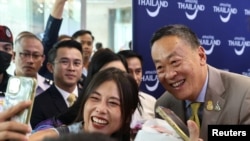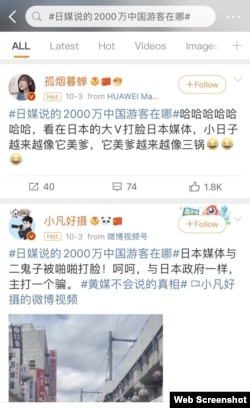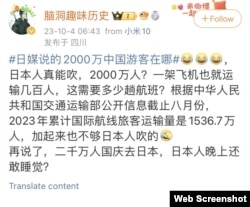From September 29 to October 6, China celebrates the Mid-Autumn Festival and National Day. The holiday is known as Golden Week, and it is China’s longest public holiday break this year since Beijing further loosened strict COVID-19 travel restrictions for its citizens.
China ended its strict controls and lockdowns late last year, but the resumption of global travel to most countries didn’t happen until August. And for the first time since the pandemic began, millions took advantage of the Golden Week holiday to travel abroad.
At the same time, stories and posts about Chinese travelers’ experiences overseas were trending on social media over this past week.
One other trend focused on attacking Japanese news outlets and the alleged claim that they were exaggerating the number of visitors from China. These threads also tied tourism to the release of filtered radioactive water from the Fukushima plant into the Pacific Ocean, which the Chinese government strongly opposes.
Starting October 3, a few days into the holiday, this question: “Where are the 20 million Chinese travelers according to Japanese media?” was trending on China’s Weibo social media platform.
Chinese influencers accused Japanese news outlets of “spreading fake news” claiming the news media in Japan reported that 20 million Chinese would travel to Japan during the Golden Week.
One Weibo influencer, Fun History, who has over 211K followers, wrote on October 4:
“The Japanese are so good at bragging, 20 million (Chinese) travelers?...If there were indeed 20 million Chinese going to Japan, the Japanese won’t dare to sleep at night!”
That is misleading.
The 20 million number originated from a September 25 report by Bloomberg Japan. It quoted a Chinese Civil Aviation Administration official as saying, “more than 21 million people will travel by air during the holiday period.”
The article listed several popular foreign travel destinations for Chinese travelers, including Thailand, South Korea, Singapore, Australia, and the United Kingdom.
Bloomberg noted that Tokyo is also a popular destination, with Tokyo-Shanghai and Tokyo-Beijing flights among the top 10 international flight bookings before the holidays.
The Japan Times used data analysis by the Chinese internet search giant Baidu and other companies in reporting that Japan tops the list of popular overseas destinations for Chinese travelers during China’s Golden Week.
The Yomiuri Shimbun, citing All Nippon Airways, reported that flights departing from China were fully booked during the vacation period. China Southern Airlines, which operates six routes between Japan’s Kansai Airport and mainland China, reported that some of its flights were 80-90% booked.
Polygraph.info could not find any Japanese news media reports that “20 million Chinese” were traveling to Japan during the holiday.
However, angry netizens on Weibo accused the Japanese media of spreading such fake news.
One post said: “Anyone with a little bit of patriotism will not go to Japan. Some Japanese are deliberately trashing us on our National Day!”
Another post said: ”[S]o don’t tell jokes in front of the ocean, especially the ones that don’t make sense at all. See, you’ve got revenge from the ocean.”
That post referred to the October 5 tsunami advisory for islands in eastern Japan following a magnitude 6.6 earthquake 550 km south of Tokyo.
While Japan and China were once wartime enemies, their relationship since then has become more pragmatic. That changed in recent months after Japan’s release of treated radioactive water into the Pacific Ocean.
On October 2, China’s state-owned Global Times newspaper published an opinion piece by Da Zhigang, director of the Institute of Northeast Asian Studies at Heilongjiang Provincial Academy of Social Sciences, accusing Japanese media of trying to create the narrative that Tokyo’s release of radioactive water into the Pacific Ocean was not keeping Chinese people from traveling to Japan.
“Since Japan started to discharge nuclear-contaminated water into the sea, it has used various ways to influence public opinion to avoid taking responsibility. This time, the Japanese media is using our ‘Golden Week’ to play off the blame,” he wrote.
Da Zhigang added that “it is vital to debunk the Japanese media’s public opinion influence campaign and false propaganda.”
Japan began releasing treated radioactive water into the Pacific Ocean on August 24. The Chinese government fiercely criticized the release and repeatedly demanded that it be halted. China, the largest importer of Japanese seafood, blocked all such imports the day Tokyo began releasing the treated radioactive water.
Japan says the water is diluted and safe, and that the International Atomic Energy Agency (IAEA), the U.N. nuclear watchdog, has approved the process and is monitoring it.
Time magazine wrote on September 8 that “a seemingly coordinated campaign has been waged on social media and Chinese news media to vent outrage and hysteria about the dangers of radiation imposed by China’s neighbor to the east.”
On October 5, Japan began a second round of radioactive water releases. China’s Foreign Ministry reiterated that Beijing “firmly oppose this unilateral move by Japan,” and called on Japan to “respond to all the concerns of the international community.”
Many scientists say the water discharge will have a negligible impact on the environment and human health. The US has backed Japan, and nearby Taiwan has agreed that the amount of radionuclides being released should have “minimal” impact.
Other neighboring countries, such as South Korea, said they respect the IAEA’s decision after the South Korean government published a study indicating that the release of Fukushima wastewater would have a negligible effect on the South Korean environment.








